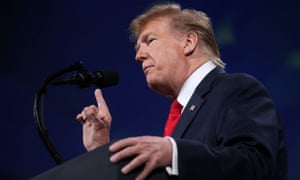In fighting all oversight, Trump has made his most dictatorial move
The president is treating Congress with contempt. This cannot stand – and Congress must fight back

“We’re fighting all the subpoenas,” says the person who is supposed to be chief executive of the United States government.
In other words, there is to be no congressional oversight of this
administration: no questioning officials who played a role in putting a
citizenship question on the 2020 census. No questioning a former White
House counsel about the Mueller report.No questioning a Trump adviser about immigration policy. No questioning a former White House security director about issuances of security clearances.
No presidential tax returns to the ways and means committee, even though a 1920s law specifically authorizes the committee to get them.
Such a blanket edict fits a dictator of a banana republic, not the president of a constitutional republic founded on separation of powers.
If Congress cannot question the people who are making policy, or obtain critical documents, Congress cannot function as a coequal branch of government.
If Congress cannot get information about the executive branch, there is no longer any separation of powers, as sanctified in the US constitution.
There is only one power – the power of the president to rule as he wishes.
Which is what Donald Trump has sought all along.
The only relevant question is how stop this dictatorial move. And let’s be clear: this is a dictatorial move.
The man whose aides cooperated, shall we say, with Russia – the man who still refuses to do anything at all about Russia’s continued interference in the American political system – refuses to cooperate with a branch of the United States government that the Constitution requires him to cooperate with in order that the government function.
Presidents before Trump occasionally have argued that complying with a particular subpoena for a particular person or document would infringe upon confidential deliberations within the executive branch. But no president before Trump has used “executive privilege” as a blanket refusal to cooperate.
How should Congress respond to this dictatorial move?
Trump is treating Congress with contempt – just as he has treated other democratic institutions that have sought to block him.
Congress should invoke its inherent power under the constitution to hold any official who refuses a congressional subpoena in contempt. This would include departmental officials who refuse to appear, as well as Trump aides. (Let’s hold off on the question of whether Congress can literally hold Trump in contempt, which could become a true constitutional crisis.)
“Contempt” of Congress is an old idea based on the inherent power of Congress to get the information it needs to carry out its constitutional duties. Congress cannot function without this power.
How to enforce it? Under its inherent power, the House can order its own sergeant-at-arms to arrest the offender, subject him to a trial before the full House, and, if judged to be in contempt, jail that person until he appears before the House and brings whatever documentation the House has subpoenaed.
When President Richard Nixon tried to stop key aides from testifying in the Senate Watergate hearings, in 1973, Senator Sam Ervin, chairman of the Watergate select committee, threatened to jail anyone who refused to appear.
Congress hasn’t actually carried through on the threat since 1935 – but it could.
Would America really be subject to the spectacle of the sergeant-at-arms of the House arresting a Trump official, and possibly placing him in jail?
Probably not. Before that ever occurred, the Trump administration would take the matter to the supreme court on an expedited basis.
Sadly, there seems no other way to get Trump to move. Putting the onus on the Trump administration to get the issue to the court as soon as possible is the only way to force Trump into action, and not simply seek to run out the clock before the next election.
What would the court decide? With two Trump appointees now filling nine of the seats, it’s hardly a certainty.
But in a case that grew out of the Teapot Dome scandal in 1927, the court held that the investigative power of Congress is at its peak when lawmakers look into fraud or maladministration in another government department.
Decades later, when Richard Nixon tried to block the release of incriminating recordings of his discussions with aides, the supreme court decided that a claim of executive privilege did not protect information pertinent to the investigation of potential crimes.
Trump’s contempt for the inherent power of Congress cannot stand. It is the most dictatorial move he has initiated since becoming president.
Congress has a constitutional duty to respond forcefully, using its own inherent power of contempt.
**************
from over here it appears Congress Republicans are behaving like puppies instead of lions on behalf of all the People, it will end in tears, or Civil War, again




No comments:
Post a Comment